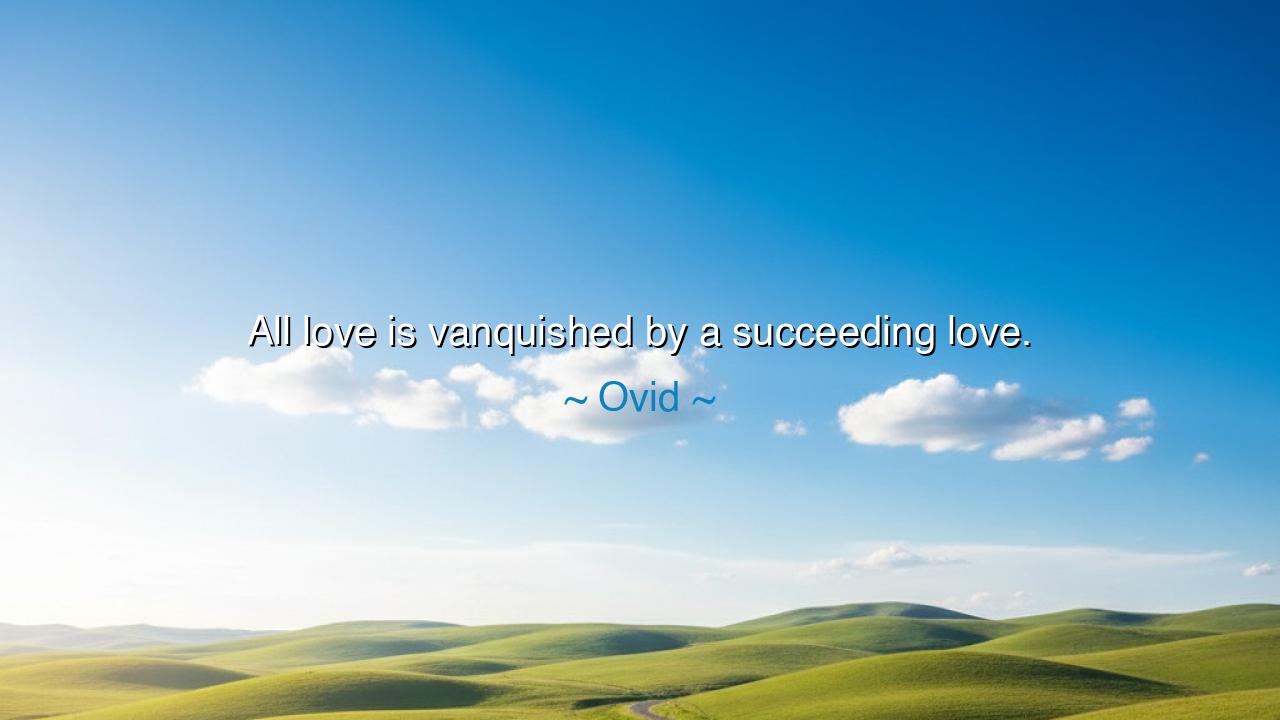
All love is vanquished by a succeeding love.






"All love is vanquished by a succeeding love." – Ovid
In the golden age of Rome, the poet Ovid, master of passion and transformation, penned these immortal words: “All love is vanquished by a succeeding love.” Beneath their graceful rhythm lies a truth as ancient as the human heart itself — that love, like the seasons, is ever-changing, never fixed, and capable of renewal even after loss. To Ovid, love was both a fire that consumes and a river that flows onward; it may burn fiercely for a time, but when it fades, it gives way to another flame. Thus, no sorrow is final, and no passion eternal — for the heart, though wounded, always remembers how to beat again.
The origin of this quote can be found in Ovid’s Remedia Amoris — The Remedies for Love — a poetic guide written for those who had suffered from the ache of desire. In this work, Ovid speaks as both physician and philosopher of the heart, offering counsel to those ensnared by unreturned or fading love. His wisdom is not cold or cynical; it is compassionate, grounded in the understanding that to heal from love’s wounds, one must not retreat from life, but return to it. “Let new passions replace the old,” he writes, for the heart renews itself through love, as the earth renews itself through spring after winter’s frost.
To the ancients, love was both blessing and burden — a force divine in origin yet deeply human in its consequences. They knew that love could elevate or destroy, inspire or enslave. Yet Ovid’s insight was revolutionary in its hopefulness: he believed in the heart’s resilience. “All love is vanquished by a succeeding love” means not that love is fickle, but that it is alive, capable of transformation. It teaches that the cure for sorrow is not the death of feeling, but the rebirth of affection — a higher, wiser, gentler love that grows from the ashes of the old.
Consider the story of Cleopatra, queen of Egypt, whose life was entwined with great loves that shaped the course of empires. First came Julius Caesar, whose brilliance and ambition captivated her. Yet when he was gone, it was Mark Antony who claimed her heart. Her love for Caesar did not vanish into bitterness — it transformed, flowing like a river toward another source. Though their fates ended in tragedy, Cleopatra’s story reveals the eternal law Ovid spoke of: that love does not die; it changes form, moving from one vessel to another, from one chapter of the soul to the next.
This truth is not confined to romance alone. In every realm of life — friendship, purpose, faith — the heart’s devotion may waver, but never remains empty. When one dream fades, another arises to take its place. The human spirit, made in the image of the divine, cannot remain barren; it seeks always to love again. Just as the tree sheds its leaves only to bear fruit anew, so the soul sheds its old attachments to make room for the new. To resist this cycle is to resist life itself, for to live is to love, and to love is to change.
Yet Ovid’s teaching also bears a quiet warning: that each love carries the power to conquer the one before it, and therefore we must love wisely. If we give our hearts recklessly, chasing passion after passion, we risk scattering the sacred energy meant for growth and peace. But if we allow each love — even those that end — to deepen our understanding, to refine our spirit, then every “succeeding love” becomes not a conquest, but a continuation of the divine work of the heart.
So, my children of the eternal flame, remember this lesson: do not mourn the passing of love, but honor it by loving again. When the heart breaks, let it not turn to stone, but to soil — fertile ground for new beginnings. When one love departs, another may come, perhaps quieter, purer, or truer. This is not betrayal of the old, but fulfillment of love’s destiny — to grow, to move, to teach us how to live.
For in the end, as Ovid taught, the heart’s greatest strength lies not in its constancy, but in its capacity for renewal. Every love leaves its mark, every love shapes the soul. And though one passion may be vanquished by another, love itself — the divine essence within us — is never defeated. It lives on, ever transforming, ever redeeming, ever leading us closer to the eternal truth: that to love, in all its forms, is to be forever reborn.






AAdministratorAdministrator
Welcome, honored guests. Please leave a comment, we will respond soon